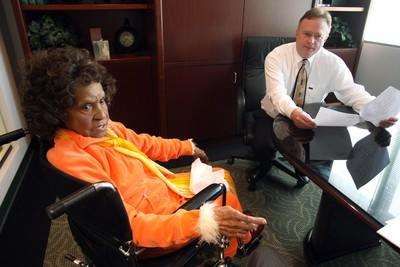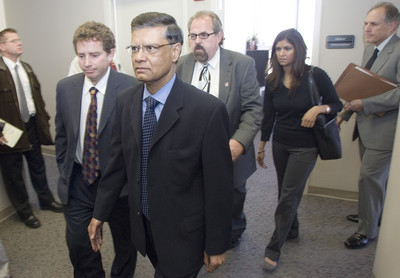Going for head of class
Allegations of medical malpractice at the Endoscopy Center of Southern Nevada have touched off a major battle among local trial attorneys scrambling to represent the 40,000 clinic patients who might have claims in the case.
The Southern Nevada Health District revealed Feb. 28 that the clinic's reuse of syringes and vials of medicine could have exposed 40,000 patients to HIV and hepatitis B and C. By March 2, a fusillade of law-firm advertisements peppered local newspapers and television stations, as lawyers reached out to consumers who had procedures performed at the center.
But efforts to find new clients might not pay off for every firm. A District Court judge will likely combine most of the cases into a single class action, and appoint lead attorneys and a steering committee for the case. The consolidation will mean that a few attorneys -- some of whom will have invested considerable dollars in finding clients and mounting a case -- will lose the opportunity to be primary representatives on lawsuits related to the clinic.
The stakes to spearhead a class action against the endoscopy clinic are high.
Attorneys said it's too early to determine the damages possible in the case. A similar case in Omaha, Neb., where 99 patients contracted hepatitis C at a cancer center, was settled confidentially.
But Richard Harris, managing partner of the Richard Harris Law Firm in Las Vegas, said the center's shutdown has generated the largest volume of calls he's ever received on a single case. Harris' law office is fielding hundreds of calls a day from potential clients.
Robert Eglet, a senior partner in the Las Vegas law firm Mainor Eglet Cottle, received thousands of calls in the days after the health district announced its findings, and he'd signed up about 1,500 clients by March 9. He's keeping the office open 12 hours a day and adding weekend hours to handle the volume of business.
More than a dozen other firms, some from New York and Arizona, flocked to Las Vegas in a bid to attract clients. In addition to advertising campaigns, they rolled out Web sites trolling for Endoscopy Center patients.
The marketing efforts could be for naught, though.
Sometime in the next few months, a District Court judge will decide whether to certify one or more of the 15 or so lawsuits filed thus far as the representative for all the plaintiffs. If he certifies the class action, then he'll fold all cases into that single lawsuit. Then, he'll name a steering committee of two to four law firms to organize the case and direct discovery and litigation. From that committee, he'll name lead counsel to oversee all facets of the class action for the plaintiffs.
Judges weigh several criteria when they're choosing steering committees and lead attorneys, Eglet said.
They'll look for veteran attorneys with years of experience, and they'll also gravitate toward law firms with proven class-action track records. Judges tend to prefer larger firms as well, because a firm with just two or three attorneys might not have the infrastructure to manage a class action with thousands of claimants.
And aside from hiring attorneys with extensive class-action backgrounds, there's little a law firm can do to bolster its chances for lead counselorship. They can't directly lobby a judge for lead status, and they often don't count on landing the top position on a case.
"It's not like we're aspiring to the position," Harris said. "We will present to the court a large number of clients we represent. We feel we're able and competent to handle this case all the way through, but it's going to be up to the judge whether we're lead counsel or on the plaintiffs' committee. It's pretty subjective."
Harris' philosophical tone belies the significant early investment some lawyers make in assembling a class action.
First, there are the marketing expenses of assembling a client base with thousands of plaintiffs. Then there's the cost of building a case: testing clients for disease, hiring expert witnesses, conducting research. Eglet's firm is representing hundreds of plaintiffs in a nationwide class action against Merck & Co., maker of painkiller Vioxx.
Excluding marketing costs, which law firms aren't supposed to pass on to clients, Eglet's firm spent seven figures mounting a case. And before the Endoscopy Center's action is resolved, there's "no question" Mainor Eglet Cottle could spend "well over" $1 million putting together its case, Eglet said.
So what happens to the firms locked out of lead status?
Some will refer their clients to the class action's leaders and committee members.
That's what happened in the Vioxx case, for which Mainor Eglet Cottle took many referrals. A number of firms act almost as brokerage houses to bigger trial attorneys, scooping up plaintiffs and directing them for a referral fee toward the attorneys who end up helming a class action.
Referring attorneys don't generally invest heavily in putting together a case, because they don't plan to direct litigation, so they won't suffer if a judge appoints other attorneys as case leaders.
Other lawyers might decide to hang on to the 15 or 20 clients they have, and represent them as part of the class action. They won't have the power to litigate the proceedings -- they'll just be monitoring the case as it wends its way through the courts. But they can keep the clients they found before they sued.
Attorneys also could arrange to associate with lead counselors for a fee, and help litigate the case within certain parameters established in a contract.
Local lawyers said they expect cordial and collegial relationships to prevail among both winners and losers in the fight to represent Endoscopy Center patients.
"There's not a lot of bitterness," Harris said. "Even though there's competition for clients, everyone has the best interests of the community at heart. Whether their class is certified or not, attorneys can still represent their clients and have the ability to participate in the case. We won't see any cutthroat tactics."
Eglet agreed: "Lawyers in Nevada generally respect each other, and they don't engage in a lot of the backbiting that goes on in bigger, more populous states where competition is more fierce and intense."
This story first appeared in the Business Press. Jennifer Robison writes for the Business Press' sister publication, the Las Vegas Review-Journal. She can be reached at jrobison@reviewjournal.com or 380-4512.
You've done everything right. Your business is ethical, and it emphasizes helping its customers. Still, even the best-run companies can face personal-injury and class action lawsuits over their products and services. Here's how to protect your corporation and your personal assets:
Think about organizational structure
Entrepreneurs have a few options when they're incorporating. They can form corporations, general partnerships or limited-liability companies. Business owners often choose from those possibilities based on how they want to limit their tax burdens.
But Nancy Rapoport, the Gordon & Silver Ltd. Professor of Law at the Boyd School of Law at the University of Nevada, Las Vegas, said they should also ask for advice on which type of organization offers the best protection of their personal assets. LLCs, for example, typically guard owners' personal property a little more effectively than corporations. General partnerships are "the riskiest" for personal-asset protection, she said.
Follow the laws your organizational form requires
It's not enough to sign incorporation papers, Rapoport said. Business owners also need to follow every rule and regulation governing the type of company they've established, or the operation's status as a corporation that defends personal assets could be null.
Not honoring the laws of the business type they've chosen is the "main mistake" entrepreneurs make, she said. Common mistakes include ignoring bylaws, not having a corporate board and using business assets for personal objectives.
"It's piercing the corporate veil," she said. "The law says that if you're not careful about keeping the business entity separate from your personal assets, or if you're using the business entity as your own personal set of assets, then people can go after you personally. If you start using your LLC as your own personal piggy bank, then you have not respected the (corporate form)."
Keep up with written policies
Businesses also create liabilities when owners fail to hew to the day-to-day operating procedures laid out in manuals and guidebooks. If a company has written policies on how to use company supplies, for example, and an executive overrides those policies with a verbal order, that can cause problems later.
"You have all sorts of messiness people can latch onto," Rapoport said. "They can say, 'You didn't even follow your own written rules.'"
There's just one thing worse for a company's liability defense than ignoring rules: Ignoring rules and lying about it.
Understand that bankruptcy is a mixed bag
If a business files for bankruptcy before plaintiffs can get a judgment and collect on it, then those plaintiffs become unsecured creditors and go practically to the end of the line among entities entitled to a company's assets.
But a business that's solvent will still have to pay its creditors 100 cents on the dollar, and if they're very solvent, they'll even have to pay interest to creditors, Rapoport said.
"Bankruptcy is not an automatic get-out-of-debt-free card," she said. "It'll help a company restructure some of its debt, but it's not an escape clause."
Bankruptcy can help in cases in which company owners had to sign personal guarantees on office or equipment leases, for example. For new businesses without credit histories, owners will often have to personally assure vendors that they'll cover an agreement in times of trouble. Bankruptcy won't cancel out an executive's personal liability on those contracts, but if business is drying up thanks to a lawsuit and a company is having problems meeting its rent, bankruptcy can halt foreclosures and stay ejection proceedings for a while, Rapoport said.
JENNIFER ROBISON/REVIEW-JOURNAL























